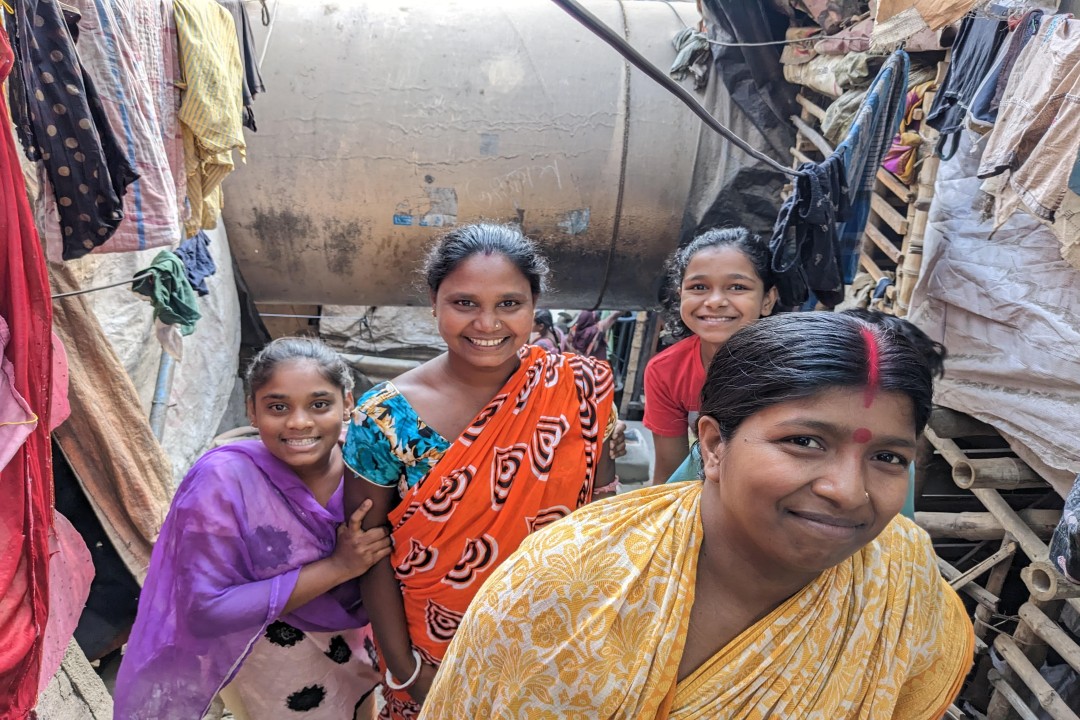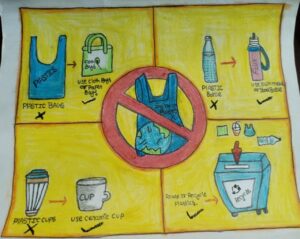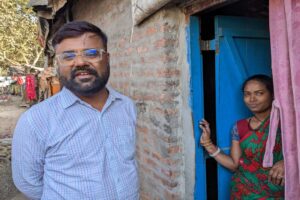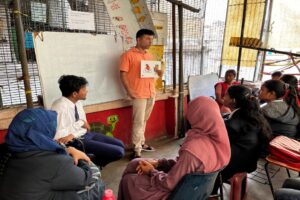
By Sean Duggan
I have taken tea in a fair few memorable places over the years, from the Ritz in London to the Gymkhana Club in Delhi and on board a warship in the South Atlantic but, yesterday, lying on the floor of PInky Das’s slum home overlooking a foetid canal in North Kolkata knocks spots off all of them.
We were there to meet three women who had completed CR’s four-month sewing and embroidery course last year and had done so well that they were awarded a sewing machine at the end of it.
These treadle-powered machines (though they can be converted to run on electricity), are similar to the ones used by our mothers and grandmothers over in Europe, and give women here the power to generate an income from home using their tailoring skills.
But having an opportunity and capitalising on it are two different things, so Piers and I wanted to meet some of the prize winners and see how they had made use of their machines.
Arunava, who runs the training programme, alongside our handicraft project, took us to Prankrishna Mukharjee Lane to first meet Saraswati.
He said she was a good observer and learner on the second course, and one of six people to be awarded sewing machines in January last year.
Inside her home Saraswati showed us a pile of clothes she is repairing or altering for people living in her slum. She held up a pair of trousers she had altered – a job that took her an hour and a half and earned her RS20 (20p). Thanks to her tailoring skills she is now making around RS1,200 a month.

Saraswati is using this money to buy food and help pay for the education of her 14 year old daughter Koyel and her 10 year old son Sunny.
Her husband is a day labourer who brings home about RS100 a day, so the extra money has allowed them to buy a large gas cylinder to cook on instead of coal. Asked whether she gave her earnings to her husband, she shook her head emphatically, grinned, and said the money was hers to spend.
The second woman was a bit of a disappointment as she stopped using her machine to do alterations when she gave birth to a beautiful son seven months ago, though she said she wants to start again.
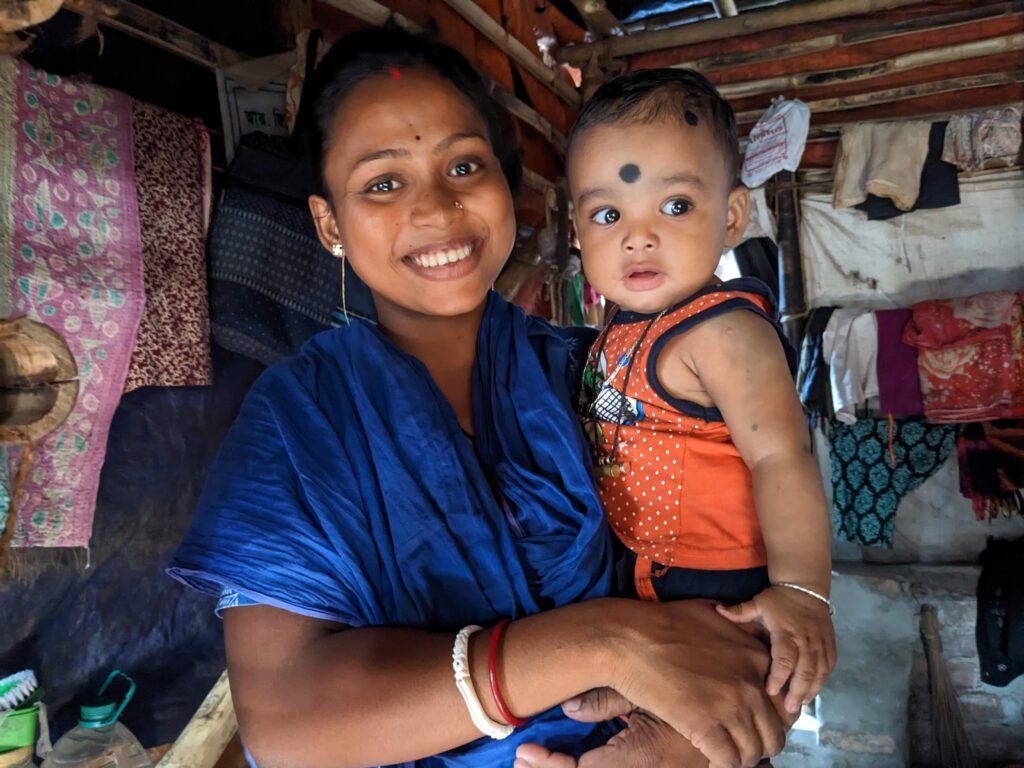
But the third woman, Pinky, was everything Piers and I could have hoped for, and more. Arunava said she was “brilliant” on the first course and, soon after graduating, had set up a stall at a weekly market selling petticoats she made for RS150 – a 100% profit margin on the cost of the material.
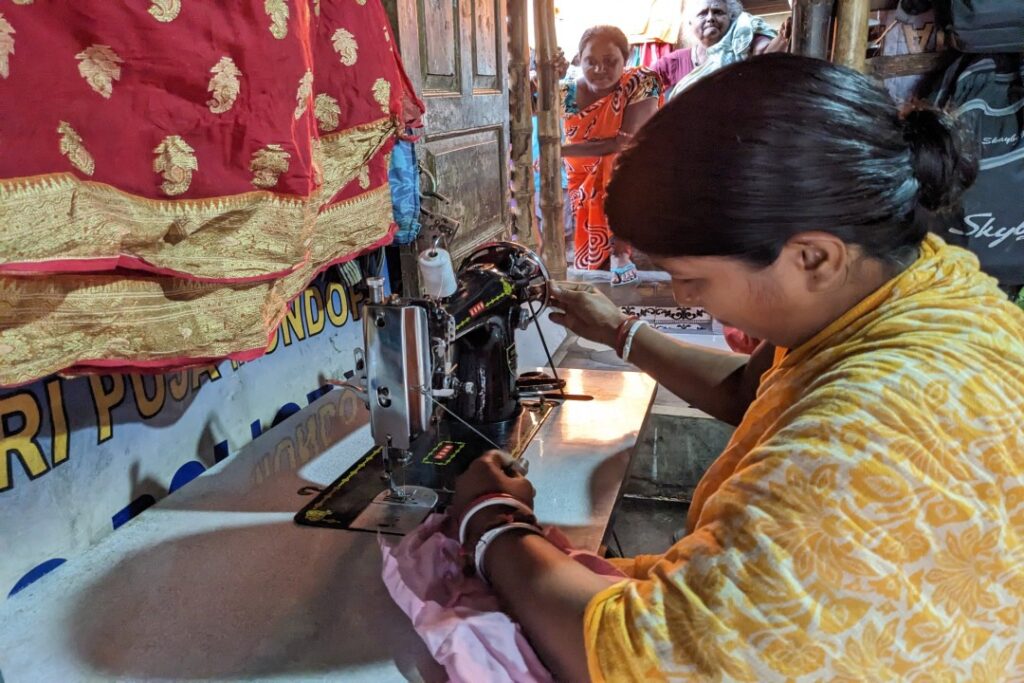
She invites us inside her home which is in a row half way down the steep bank to the canal, perched above a massive water pipe.
The lane outside is shoulder width and dark, even under the blazing afternoon sun, but inside light is flooding in from the windows above the canal.
The single room is spacious, spotlessly clean and empty apart from possessions neatly stacked around the walls, including thin mattresses for Pinky, her husband, and their three children.
If the place wasn’t constructed from bamboo and plastic sheeting, and if we didn’t know that the canal below was running with all kinds of filth, we could have been in some chic riverside apartment.
Curious neighbours peered in through the doorway as Pinky invited us to sit down and asked us whether we would like chai? When we said yes she bustled off to arrange it. Her mother arrived, beaming with excitement, to sit with us and Pinky’s children, who had a day off school because it was the start of the Year 10 exams, stood near the door smiling and watching.
When Pinky returned she gave us each a square of cake wrapped in paper and then poured chai from a metal beaker into tiny clay cups for us.
The tea was hot and delicious. We nibbled the cake and chatted with the family

Arunava told us that Pinky had recently got a job as a helper at Tala Park School and was delighted to have a regular job which paid her about RS6,000 a month.
Along with her wages from tailoring (which could amount to a similar amount in a month when the big religious festival of Durga Puja takes place) she earns more than her husband. In addition to now being able to buy things for her children and the home, she spends money on an English tutor for her children, and even has RS10,000 (£100) saved in a bank account.
This is a very big deal – because it means she is accumulating a safety margin which will help tide the family over when there is some sudden financial call.
Hardly anyone in the slums has savings, so at the first crisis, such as someone falling ill, they get into debt.
It then emerged that all her children go to CR’s Tala Park School too.
CR’s motto is Creating opportunities, transforming lives. This family is a shining example of that in action through education, training and employment.
I asked what the children want to do when they grow up? The boy said police, the youngest girl a doctor, and the older one a beautician.
My heart always sinks when CR children say they want to be a doctor, because although it is a noble ambition, even if they are very bright they face almost insurmountable hurdles. But, with support from CR, she might have a very rewarding career as a nurse or paramedic.
So many of our female students want to be beauticians. I wonder if some of them couldn’t aspire to something more challenging and rewarding and have spoken to our career counsellor, Tuli, about this. But what do I really know? For girls growing up in a slum like this, getting a regular salary working in a beauty salon must seem like a dream job.
They ask what we do and I tell them I was a journalist and Piers says he runs a plumbing and building company.
He reveals that his nickname is also Pinky and shows Pinky a photo of a bar he used to run at Glastonbury and other festivals sporting a sign Pinky’s Bar.
This causes a lot of amusement. The girls are quietly taking photos of us on their mobiles and I am snapping pictures of the family back.
All of us feel this is a rather special occasion that needs to be captured in some way.
Pinky (Das not Skinner) says that one of her daughters sang in the school’s annual show, and when an attempt to show us a video of that on her mobile fails, she encourages both daughters to get up and sing for us.
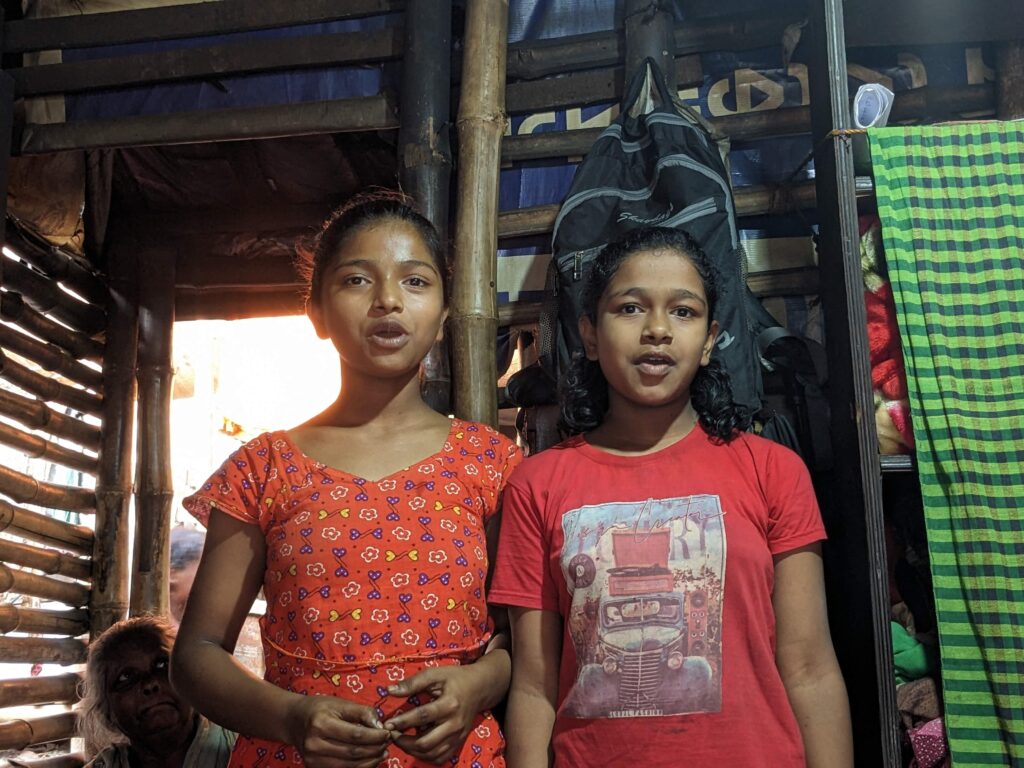
They stand up straight and serious and break into song, quietly at first and then louder.
“Heal the World – make it a better place, for you and for me and the entire human race…”
Michael Jackson’s song can rarely have been sung in a more appropriate setting.
Afterwards, Pinky says, through Arunava, how lovely it is to see us relaxing on the floor with them, as if we are family.
I say we are, we are all part of the CR family.
This is not sentimental claptrap, but an expression of a truth that I am sure everyone in that room felt at that moment.
Everyone grins and I know that for them this is a special day that will long be cherished.
Having a couple of foreigners round for tea is not something that has happened in that slum, probably ever.
But what they don’t know is that it is even more special for Piers and I. Talking about it afterwards we both say how much we loved being there and at ease with Pinky and her family. Despite being to the city many times, visiting dozens of slums, speaking to many residents over the years, neither of us ever had the privilege of sharing tea and time with a family like that.

